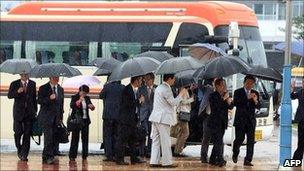North Korea issues threat to South amid joint talks
- Published

Government and business representatives from South Korea gathered at the Mount Kumgang resort
North Korea has threatened to launch "a retaliatory sacred war" against South Korea, as the two held rare talks about a stalled jointly-run tourism project.
Pyongyang said southern soldiers had erected signs on the border slandering the North's "army, system and dignity".
It said unspecified military measures would continue "mercilessly" until the South apologises and removes the signs.
Relations between the two countries have deteriorated since two fatal attacks on South Korea last year.
Government and business representatives from each side met at the tourist site of Mount Kumgang to discuss the stalled tourism operation there.
The project, which was run by a South Korean company, has been suspended since a South Korean tourist was shot dead near the site three years ago.
Seoul officials said the North was warned at the meeting not to violate the property rights of firms from the South.
Last year, North Korea froze some South Korean assets and it has threatened to seize more unless work on the project resumes.
As officials headed to the talks, North Korea issued its threat to the South in the state-run media.
The signs erected near the border, it said, were "little short of a declaration of war".
A series of incidents recently have prompted similar rhetoric from the North, including the discovery that some South Korean army reserve units were using pictures of North Korea's ruling family as target practice, says the BBC's Seoul correspondent Lucy Williamson.
That practice was subsequently stopped by South Korea's military.
Relations between the two Koreas remain fraught following last year's fatal attack on the South's Yeongpeong island and the sinking of a South Korean warship, widely blamed on a North Korean torpedo attack - although the North strongly denies any role.